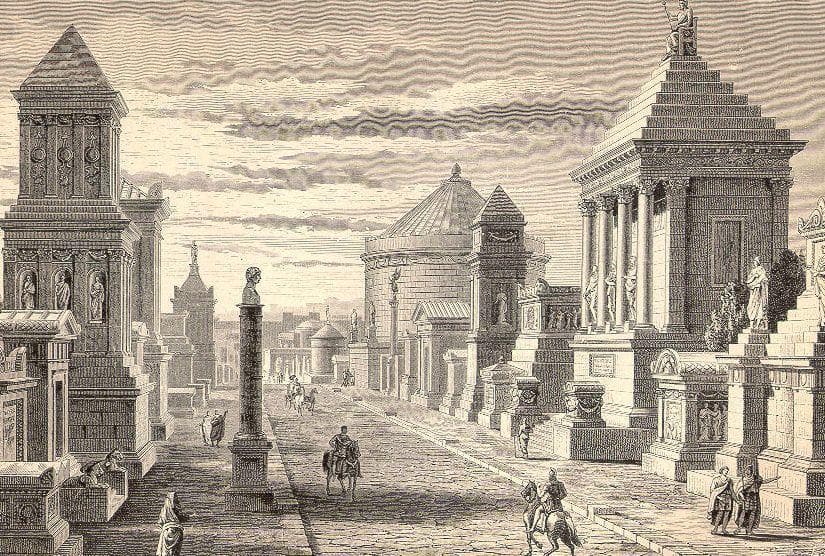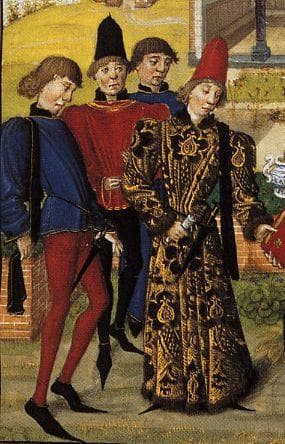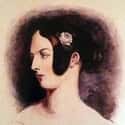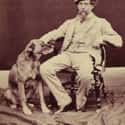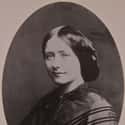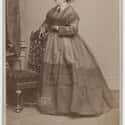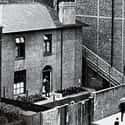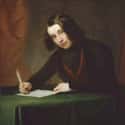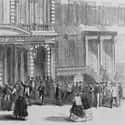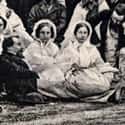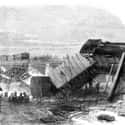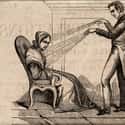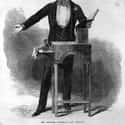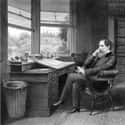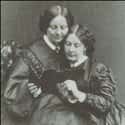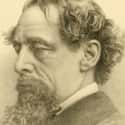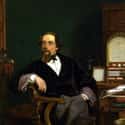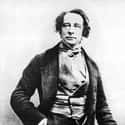-
(#1) He Had A Thing For His Deceased Sister-In-Law
After Dickens married Catherine Hogarth in 1836, his young sister-in-law moved in with them in London. But Mary Hogarth's presence in the house did not last long. The following year, 17-year-old Mary died unexpectedly in Dickens's arms. Mary's death had a profound impact on Dickens, and he went on to cherish her memory more ardently than he admired his living wife. He wore Mary's ring and took a lock of her hair, as you do when your sister-in-law passes. When he modeled Rose Maylie of Oliver Twist after Mary, Dickens let the character survive a bout of unknown illness, unable to live with even the death of her fictional self.
-
(#2) He Preserved His Deceased Pets Through Taxidermy
Charles Dickens was nothing if not a man of his age. As such, it feels unsurprising he practiced of taxidermy, and utilized this skill to stuff some of his beloved pets. A pet that met such a fate was his raven Grip, which can still be found at the Free Library of Philadelphia. In a slightly more morbid fashion, he also stuffed the paw of his favorite cat Bob and affixed it to an ivory letter opener. Dickens loved animals, especially ones he got to toy with and make toys of.
-
(#3) He Had A Secret Affair With A Teenager
Charles Dickens cultivated an image of being an upstanding, moral Victorian gentleman. But it was an illusion. Privately,Dickens fell out of love with his wife after she gave him 10 children. In 1857, the 45-year-old Dickens began an affair with 18-year-old Ellen Ternan, an actress in a play he produced. His affair with Ternan, lasting a total of 13 years, largely took place in a house Dickens bought for the actress just outside of London. Dickens and/or Ternan thoroughly destroyed their correspondence, and very few ended up knowing about the affair. Even fewer still knew of the possible child they had together who died in infancy, whose existence was noted of by Katey and Henry Dickens.
-
(#4) He Humiliated His Wife By Publishing Details About Their Failing Marriage
When Dickens's marriage fell apart in 1858, rumors swirled throughout London about his household. Rather than ignoring them and taking the high road, Dickens couldn't resist the spotlight. So in June 1858, he published an article in the London Times addressing the rumors. Though he neither confirmed nor denied the separation, his airing of private laundry drew criticism from many; furthermore, during the following 20 years of Catherine Dickens' life people said she never recovered from the divorce.
-
(#5) He Had A Soft Spot In His Heart For Prostitutes
Like many Victorians, Charles Dickens was liberal-minded and became interested in the plight of prostitutes. In his mind, these "fallen women" needed help to be rehabilitated into society. So Dickens worked alongside millionaire philanthropist Angela Burdett-Coutts to establish a home for prostitutes at Urania College where they would receive moral and financial assistance. Ultimately, most of the women at Urania would be shipped off to the colonies.
-
(#6) He Left School At The Age Of 12 To Make Money For His Starving Family
If you ever wondered why Charles Dickens wrote so profoundly of the poor in Victorian England, it's because he experienced poverty firsthand. When his father was sent to debtor's prison, the then-12-year-old Dickens left school and took up factory work to support his otherwise income-less family. Though Dickens became a wildly successful writer, he never forgot the trials of his youth. In fact, his toil as a youngster directly influenced his depictions of hardworking young characters like David Copperfield.
-
(#7) America Really Wasn't His Cup Of Tea
Charles Dickens toured the United States twice: his first tour was in 1842 and the second in 1867. It would be an understatement to say he found himself unimpressed with the land of liberty. He published no less than two books about his American travels, accusing crude Americans of being uncouth opportunists who read pirated versions of his work for free. Upon visiting Washington DC, Dickens called it "head-quarters of tobacco-tinctured saliva." Despite Dickens' overt, and published, animosity, the feeling was hardly mutual, and most US fans continued to adore his work much later into his career.
-
(#8) He Became A Resentful Father
Charles Dickens bore a total of ten children with his wife. Though a doting father during his children's younger years, he gradually lost interest in them as they grew up. Once they became teenagers and young adults, he saw them more as burdens than delights, even trying to decide his sons futures the moment they entered their teenage years. Yet even when his marriage fell apart, he followed the trends of his era and denied his estranged wife custody of their children.
-
(#9) A Horrible Train Accident Nearly Derailed His Life
On June 9, 1865, Dickens was riding on a train with Ellen Ternan and her mother when it derailed in Kent. The incident was terrible - 10 people died and many more injured. The accident, though, brought out the best in Dickens. He immediately leapt into hero mode, tending to the wounded and offering them brandy from his own flask and water. Though Dickens emerged from the incident physically unscathed, it left a deep psychological impact on him. Had he been in a different car, it might have also led to his death.
-
(#10) He Was Enthusiastic About Mesmerism
Though Charles Dickens was skeptical of spiritualism and ghosts, he was a believer in mesmerism. One of the Victorian era's many supernatural crazes, mesmerism was the belief that men and women could be cured through hypnosis. A follower of the mesmerist John Elliotson, Dickens once claimed to have used mesmerism to cure a friend's insomnia.
-
(#11) He Actually Was A Victorian Celebrity Who Enjoyed The Spotlight
Many people believe novelists to be quiet, solitary individuals who avoid the spotlight at all costs. Not so for Charles Dickens. A storyteller at heart, Dickens loved doing public readings and performing his works for audiences. He was also a good actor, and his theatrical productions were wildly popular. His performances took him all over Britain and even to the United States, making him a bona fide international celebrity.
-
(#12) He Coined A Bunch Of Words And Phrases Still Used Today
Charles Dickens - like Shakespeare, another great English writer - created words and phrases when the English language failed him. And, like Shakespeare, people still use many of them today. Among his linguistic inventions were words like "butter-fingers" and "dustbin." Some of his characterizations and names were so vivid they have since lived beyond his stories - names like "Scrooge," for example, have evolved from names to universal descriptors.
-
(#13) He May Have Turned His Sister-In-Law Against His Wife
Following the death of Mary Hogath, another of Dickens's sisters-in-law moved into the house to help with the family. Georgina Hogarth was 15 when she came to live with her sister and brother-in-law. When the Dickens marriage crumbled in the 1850s, Georgina immediately sided with her brother-in-law, essentially turning her back on her own sister, whose name Charles publicly dragged through the mud. After the separation, Georgina continued on as a surrogate "angel in the house" to replace her sister - she basically ran the Dickens household. Although Dickens vehemently maintained that his relationship with Georgina was pure, rumors circulated that they had an affair.
-
(#14) Against His Wishes, He Was Buried In Westminster Abbey
When Charles Dickens died on June 9, 1870, his final wishes were clear: to be buried at Rochester Cathedral in an unfussy ceremony. These final wishes were virtually ignored, however. Instead, his funeral went through with the pomp and ceremony expected of a Victorian celebrity. While his funeral service only had 12 attendees, his oepen casket lay in Westminster Abbey for two days for mourners to pay their respects before it was closed and interred in Poet's Corner.
-
(#15) Some People Can't Resist Diagnosing Him With Various Ailments And Conditions
According to some, Dickens could have suffered from any number of conditions. A few people claim he had epilepsy, though beyond some vivid descriptions of seizures in his novels there is little evidence to support this claim. Others hypothesize he might have had a mild form of OCD, since he was known to rearrange furniture obsessively and brush his hair repeatedly. The fact remains, though, that it is nearly impossible to diagnose Dickens from the grave.
-
(#16) He Fervently Believed In Spontaneous Human Combustion
Bleak House is one of Dickens's most well known works, but it features a scene that would make any modern reader do a double take:
"Then they saw the pile of ash on the floor. They stared for a moment, before turning and running. They burst onto the street, shouting for help. But it was too late: Old Krook was gone, a victim of spontaneous combustion."
Yes, a Dickens character dies from spontaneous combustion. While science wasn't exactly at its best in the 1850s, there was enough reason in the world for this plot point to draw considerable criticism and indignation. Nowadays an author might tweet a half-assed apology and move on with it, but Dickens had his own way of doing things. He went on the offensive and began to angrily cite obscure stories and pseudosciences as proof of the validity of his story.
Dickens carried on the battle for 10 months, only dropping the issue when Bleak House was finally fully published in all its monthly installments. Unfortunately, Dickens had such a hold on the popular imagination that he inadvertently gave the theory a whole new life, and it continued on in the popular imagination for years, even showing up in a medical text in 1928. Just so we're clear spontaneous combustion is not real.
New Random Displays Display All By Ranking
About This Tool
Charles Dickens is known for his great literary achievements, and he is considered one of the greatest writers since the 19th century. His novels pay special attention to depicting the tragic life experiences of the bottom characters in British society, deeply reflecting the complicated social reality of the British society at that time, and making outstanding contributions to the development of critical realism literature. His works have had a profound influence on the development of world literature.
We cannot deny his achievements and contributions, but there are more true dark stories of Charles Dickens behind his literary works. He is a complicated person and far less kind and tolerant than people think. The random tool reveals 16 dark things Charles Dickens did.
Our data comes from Ranker, If you want to participate in the ranking of items displayed on this page, please click here.

